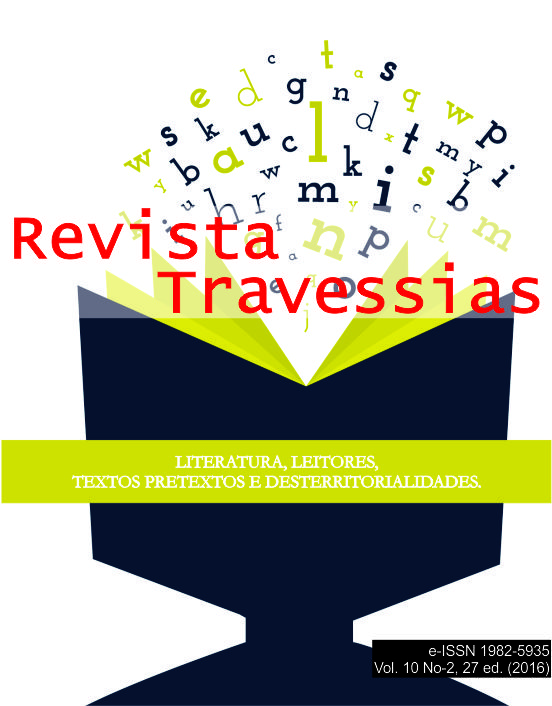The reality knocks the door: the confrontation among teacher’s instruction, society’s speech and the multilingual classroom reality
Keywords:
Linguistic variation, teacher’s instruction, identity construction.Abstract
It is more and more evident that Portuguese teachers live a dilemma in the classroom: on one hand, the society’s rooted belief that the Portuguese teacher must teach “the good Portuguese” or “the correct Portuguese”, directly associated to the standard or “cult” variation, as some prefer to call it. On the other hand, the teacher is daily faced with the reality of the classroom which points to the existence of a linguistic heterogeneity and contradicts the belief of a monolingual nation. Yet, this professional’s former instruction, many times, superficially deals with linguistic heterogeneity – when it does – which collaborates for the Portuguese teachers’ feeling of doubt: after all, “which Portuguese is it to be taught”? It is in the middle of this conflict that the teacher experiences a constant process of professional identity construction, distressful in many times. The present article does not aim to present definite solutions; instead, its proposal is to discuss the language teacher’s former instruction with focus on the linguistic heterogeneity found along his training period at college and consequently professional life, considering his/her process of professional identity construction. The theoretical discussion is based on readings about identity (HALL, 2000), language and tongue conceptions (PERFEITO, 2007; CÉSAR; CAVALCANTI, 2007), linguistic heterogeneity in classroom and teacher’s instruction (BAGNO, 2009; BRASIL, 1998, OLIVEIRA, 2008; SIQUEIRA, 2012).
Downloads
References
ALTENHOFEN, Cléo Vilson. Áreas linguüísticas do Português falado no Sul do Brasil: um balanço das fotografias geolinguísticas do ALERS. In: AGUILERA, Vanderci de Andrade (Org.). A geolínguística no Brasil: caminhos e perspectivas. Londrina: Eduel, 2013. p. 177-208.
BAGNO, Marcos. Não é errado falar assim! em defesa do português brasileiro. São Paulo: Parábola Editorial, 2009.
BORTONI-RICARDO, Stella Maris. A sociolingüística na sala de aula. In: 56ª Reunião anual da SBPC, 2004, Cuiabá. Anais... Cuiabá – MT, 2004. Disponível em: <http://www.sbpcnet. org.br/livro/56ra/banco_conf_simp/textos/StellaRicardo.htm. Acesso em 23 set 2014.
BRASIL. Secretaria de Educação Fundamental. Parâmetros Curriculares Nacionais: terceiro e quarto ciclos do Ensino Fundamental: Introdução aos Parâmetros Curriculares Nacionais / Secretaria de Educação Fundamental. Vol. 1. Brasília: MEC/SEF, 1998. Disponível em: <¬ http://portal.mec.gov.br/seb/arquivos/pdf/livro01.pdf >. Acesso em 05 ago. 2012.
CÉSAR, América L.; CAVALCANTI, Marilda C. Do singular para o multifacetado: o conceito de língua como caleidoscópio. In: CAVALCANTI, Marilda C.; BORTONI-RICARDO, Stella Maris (Orgs.). Transculturalidade, linguagem e educação. Campinas: Mercado das Letras, 2007. p. 45-66.
FRITZEN, Maristela Pereira. “Ichsprecheanders, aber das istauch Deutsch”: línguas em conflito em uma escola rural localizada em zona de emigração no sul do Brasil. Trabalhos em Linguística Aplicada, Campinas, 47(2): jul/dez. 2008, p. 341-356.
GNERRE, Maurizion. Linguagem, escrita e poder. 5. ed. São Paulo: Editora WMF Martins Fontes, 2009.
HALL, Stuart. Quem precisa da identidade? In: SILVA, Tomaz Tadeu da (Org.). Identidade e diferença: a perspectiva dos estudos culturais. Petrópolis: Vozes, 2000. p. 103-133.
KLEIMAN, A. Os estudos de letramento e a formação do professor de língua portuguesa. Linguagem em (Dis)curso, Tubarão, v. 8, n. 3, p. 487-517, 2008.
MAHER, T.M. Em busca de conforto linguístico e metodológico no Acre indígena. Trabalhos em Linguística Aplicada. Campinas, no. 47(2), jul./dez., 2008, p. 409-428.
OLIVEIRA, Mariangela Rios de. Preconceito lingüístico, variação e o papel da universidade. Caderno de Letras da UFF: Dossiê Preconceito lingüístico e cânone literário. Rio de Janeiro, p. 115-129, 1 sem. 2008. Disponível em: < http://moodle.stoa.usp.br/file.php/1103 /textos/Norma_e_Ensino/OLIVEIRA_PreconceitoLinguistico_PapelDaUniversidade.pdf> Acesso em 15 set 2014.
PERFEITO, Alba Maria. Concepções de linguagem e análise linguística: diagnóstico para propostas de intervenção. In: Congresso latino-americano sobre formação de professores de línguas. 1. 2006, Florianópolis. ABRAHÃO, M. H. V; GIL, G; RAUBER, A. S. (org.). Anais... Florianópolis: Universidade Federal de Santa Catarina. 2007. p. 824-836.
SCHERRE, Maria Marta Pereira. Entrevista com Maria Marta Pereira Scherre sobre preconceito lingüístico, variação lingüística e ensino. Rio de Janeiro: 2008. Caderno de Letras da UFF: Dossiê Preconceito lingüístico e cânone literário. Rio de Janeiro: n 36, p. 11-26, 1 sem 2008. Entrevista concedida a Jussara Abraçado. Disponível em: . Acesso em 15 set 2014.
SIQUEIRA, Sávio. Diversidade, ensino e linguagem: que desafios e compromissos aguardam o profissional de Letras contemporâneo? Letras & Letras, Cascavel, v. 13, n. 24, p. 35-66, 1 sem 2012. Disponível em: <http://e-revista.unioeste.br/index.php/linguaseletras/article/view/ 6955/5149>. Acesso em 19 set 2014.
Downloads
Published
How to Cite
Issue
Section
License
Creative Copyright Notice
Policy for Free Access Journals
Authors who publish in this journal agree to the following terms:
1. Authors keep the copyright and grant the journal the right of first publication, with the work simultaneously licensed under the Creative Commons Attribution License, which allows sharing the trial with acknowledgment of authorship and initial publication in this journal.
2. Authors are authorized to take additional contracts separately, for non-exclusive distribution of the work version, published in this journal (eg publish in institutional repository or as a book chapter), with acknowledgment of authorship and initial publication in this journal.
3. Authors are allowed and encouraged to publish and distribute their work online (eg in institutional repositories or on their personal page) at any point before or during the editorial process, as this can generate productive changes, as well as increase both impact and citation of the published trial (See The Effect of Free Access).
Creative Commons License
This work is licensed under a Creative Commons Attribution–NonCommercial-shareaswell 4.0 International License, which allows you to share, copy, distribute, display, reproduce, completely or part of the work, since there is no commercial purpose, and authors and source are cited.



